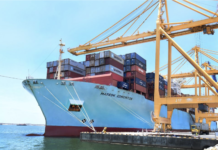
Transportation and logistics providers, port operators and regulators are warning shippers to ensure contingency plans are in place ahead of a potential strike at US East Coast and Gulf Coast ports next week.
The International Longshoremen’s Association (ILA) and the U.S. Maritime Alliance (USMX), which represents terminal operators, are at a negotiations impasse over a new labor contract that would replace the one expiring on 30 September. If a deal can’t be reached, ILA leaders have warned that their members will go on strike on 1 October.
Transportation providers have already started taking measures as a strike at the ports seems more probable. Eastern U.S. Class I railroad Norfolk Southern told customers in a service advisory that measures have been implemented to minimize potential operational impacts across NS’ rail network, including at NS’ intermodal facilities.
“We strongly recommend that customers refrain from shipping hazardous, high-value, and refrigerated international shipments via rail to avoid unexpected delays upon reaching the port destinations outlined in the attached port curtailment schedule,” Norfolk Southern said. “However, if such shipments arrive at ingates before the closures, we will make every effort to ensure their delivery ahead of the work stoppages.”
Logistics company C.H. Robinson, meanwhile, said that ocean carriers have started to limit their acceptance of cargo that might pass through East Coast or Gulf Coast ports.
Shippers have engaged in some front loading ahead of the potential strike, but ultimately customers are the ones who decide whether to ship cargo to the West Coast instead of the East and Gulf Coast ports, according to George Goldman, president and CEO of CMA CGM (North America).
“There are zero ships that I’m aware of that are being diverted to the West Coast [because of a potential strike at the ports]. As of right now, customers have made that decision. They’re the ones who will guide us as to what, for them, is the best avenue to pursue,” Goldman said last week during the Port of Los Angeles’ monthly volumes briefing on 18 September.
The operational adjustments occurring at the ports and among transportation providers are to prevent a cargo backlog that could likely arise should a work stoppage occur at the ports.
“If a strike occurs starting October 1, you can expect severe congestion and halted operations at these major ports,” said a Seko Logistics, adding that U.S. Northeast ports “are already dealing with slowdowns due to a recent surge in imports and issues with returning empty containers.”
The South Carolina Ports Authority and the ports of Houston and New Orleans said over the weekend that are extending gate hours ahead of 30 September, while the Federal Maritime Commission warned this week that all FMC statutes and regulations remain in effect during any terminal closures related to potential work stoppage at ports in the East Coast and Gulf of Mexico regions.
As transportation and logistics providers prepare for a possible strike next week, the ILA and USMX continue to seek favor from the public.
USMX said on 23 September that “Despite additional attempts by USMX to engage with the ILA and resume bargaining, we have been unable to schedule a meeting to continue negotiations on a new Master Contract. We remain prepared to bargain at any time, but both sides must come to the table if we are going to reach a deal, and there is no indication that the ILA is interested in negotiating at this time.” USMX added it “would be open” to work with the Federal Mediation & Conciliation Service.
But the ILA pointed out that USMX is “engaging in a misleading publicity campaign” since the two sides have been communicating multiple times in recent weeks. The ILA says its grievance with USMX still lies with an “unacceptable” wage increase package.
“My ILA members are not going to accept these insulting offers that are a joke considering the work my ILA longshore workers perform, and the billion dollar profits the companies make off the backs of their labor,” ILA International President and Chief Negotiator Harold J. Daggett said on 23 September.
“The blame for a coast wide strike in a week that will shut down all ports on the Atlantic and Gulf Coasts falls squarely on the shoulders of USMX,” noted Daggett.
Joanna Marsh
America Correspondent








